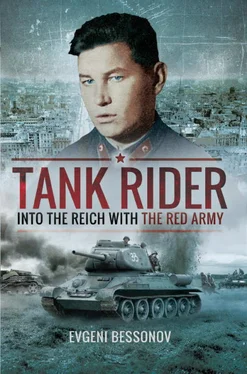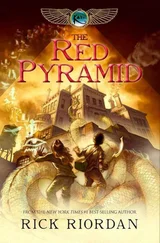Assault, assault… Many things have been written about this in literature, but an assault can be of many kinds, and the worst one among them is assaulting across an open field. First you walk, then you move forward in short rushes and as you get close to the enemy – you run as fast as you can! And the fear you go through during all this time – bullets whistling in the air, German shells and mines exploding all around. Assaulting an enemy’s position is a horrible thing for a person to do, no one knows his psychological condition during an assault and cannot honestly describe it – it would be a lie or something made up. But regardless of how scared you are, no one will fulfil your orders for you. You just run and think: ‘Will they get me or not?’ But more often you forget this as well, thinking just one thing: ‘Where is the enemy?’ If we encountered the enemy at short distance, say at 50 metres, we would cover this distance in a rush and capture the position. A platoon leader’s task is to lead this rush: ‘Forward run, open fire! Kill Fritzes!’ But if the enemy stopped us by fire at a longer distance, then the company would deploy in a line and we would only start the assault after the company or battalion commander’s order, with tanks or without them. Such an assault is scarier and there are more losses, as sometimes we did not have enough breath to run. The platoon leader’s task in such a situation is not to allow the soldiers to lie down; this is why you run shouting ‘Forward!’. The enemy would normally flee and we would jump in his trenches, barely catching our breath or continued to pursue the enemy, if we had energy for it.
The enemy fled this time too, reluctant to take us on in hand-to-hand fighting, but I decided to run as far as possible from Koretski and we ran almost to the houses of the village, where we were again stopped by intensive machine-gun fire. The platoon was pinned down. Popov was at our right flank with his platoon. There were thick bushes there, while in front of my platoon there was an open field with grass. I was lying there and saw the grass being cut down by the concentrated fire. It was good that we were lying behind a small elevation; it was very important, but some gloomy thoughts were revolving in my head: ‘They can kill me here…’ All of a sudden the machine-gun on our right ceased fire; Popov’s machine-gunners had suppressed it. The second machine-gun went silent soon afterwards. We rushed into the village; the Germans fled from it. It grew silent. Fedor did a great job and helped us out at the right moment, otherwise how long would we have to lie on the ground and listen to the grass growing? The German MG34 machine-gun was a fearsome weapon, we could not lift our heads from the ground when it fired. But thank goodness everything went well and we did not have casualties. Both Fedor Popov and I decided not to go to Colonel Koretski, and neither did he call us; apparently he had left the riverbank and carried on with his business. This is how we accidentally rescued our Corps commander – but that went unnoticed, some forgot about the case while the others simply did not know about it. A runner from the battalion commander found us and passed on the order to come back to the river and advance along it, to a place that had a convenient crossing, where the tanks and the battalion would be crossing.
On 20 April the battalion received new orders to attack in a northwestern direction towards Potsdam (a suburb of Berlin) and Brandenburg, and further towards Ketzin, thus enveloping Berlin from the west and completing the encirclement of the enemy’s troops in that city. That was the Brigade’s and the Corps’ objective. The 4th Guards Tank Army had been advancing due west, to the south of Berlin, towards the Elbe river. But the first Belorussian front under G. K. Zhukov had a hard time capturing Berlin, and Stavka redirected our Army and General Rybalko’s Army towards Berlin, or more precisely against its southern and western outskirts.
The terrain on this new direction of advance was drier; there were fewer natural water obstacles, but there were more villages and tidy German forests. We would not get more than three or four hours of sleep a day. It was already warm in Germany, so we slept not far from the roads in the grass. They fired on our column very frequently, either from woods or from any village that was next to the road. If this fire frustrated our further advance, we would as a rule dismount tanks, engage the enemy and force the enemy to retreat or destroy him. In most cases the Germans fled, leaving small arms, machine-guns and Panzerfausts behind. Such actions slowed down our advance, but on the other hand, we had to free the road from the enemy.

In one such battle Drozd and I almost kicked the bucket. They fired on us from a wood, and we immediately dismounted the tank. The 3rd company of the battalion assaulted the enemy together with my platoon (or rather, company). Everything became confused; the soldiers of our company were mixed with the soldiers of the 3rd company. I tried to restore some order, but it did not work; the platoon leaders from the 3rd company had just arrived in the battalion and I did not even know their names. We drove the enemy out of his well-dug trenches and stopped there for a brief halt, trying to see the situation and work out where the Fritzes had fled. We could see some buildings in front of us, which meant that the Germans had run there and we would have to drive them out. At that moment the enemy opened artillery fire on the trenches, but their shots so far exceeded the target. I pointed out a place some 100 metres from us, closer to the houses, to my orderly Drozd and ordered the men to dig skirmisher’s trenches there, in order to close in with the Germans for the next assault. The soldiers of my platoon and then the whole company ran forward on my command. The other company, the 3rd one, stayed where it was. Why did I decide to leave the trenches? The enemy knew the location of those trenches; the first salvo went over the target, which meant that the second salvo would definitely hit us. I advised the Lieutenant from the 3rd company to leave the trenches, but he stayed behind and even took my trench, when I left it and ran to Drozd, who was already digging the dirt. It was my turn to dig deeper, so he could have a rest – it was hard to dig with a small entrenching tool while lying on the ground, but it was impossible to stand up. The Germans were firing their small arms and would immediately send anyone who stood up to his grave. Our entire company was digging in, in military terms – concentrating for an assault. Just as I expected, the Germans opened concentrated artillery fire on the trenches – apparently, they had an excellent artillery observer. The 3rd company had casualties, but we had left the dangerous spot in the right time. The orderly of that Lieutenant ran up to the skirmisher’s trench that I shared with Drozd and informed us that their trench had been hit by a shell or a mine and the platoon leader was dead, while he himself had been lying next to the trench and escaped unscathed. Again my company soldiers and I were lucky. We captured the village, but did not pursue the enemy. There were plenty of such fast-paced clashes, the Germans held on to every village, hill, road crossing, a highway or railway embankment, a river or channel, even with small forces. This is why our advance was delayed every time we had to drive the enemy away.
This is exactly how it happened on one occasion: the column was stopped by small arms fire from a forest. The tank crews were afraid of the Panzerfaust teams attacks and did not advance further. The battalion commander ordered us to attack the enemy, and the battalion’s companies together with the machine-gun platoons of Guschenkov and Greg Kes went into the forest. I do not know where company commanders Kostenko, Chernyshov and Belyakov were – the battalion commander led us. We deployed in a line and started our cautious advance through the forest. We did not see the Germans – thick bushes blocked our view. Then, I do not remember on whose command, we rushed forward shouting, firing our submachine-guns and light machine-guns. The enemy fled, abandoning his trenches; in some places there were Panzerfaust missiles and other weapons on the ground. Our company mixed with men of the 2nd company during the assault. Company’s Sergeant Major Michael Bratchenko somehow ended up next to me; apparently the battalion commander had sent everyone who could carry weapons into action, as some men fell behind because their tanks had broken down. We walked out to the edge of the forest and I proposed moving a bit further – the forest edge was an excellent reference point for German artillery. However, the 2nd company’s officers and Guschenkov and Kes disagreed with me. Before we could finish our argument, the enemy opened up with heavy artillery and mortar fire. It all happened very suddenly, and only during the barrage did the soldiers start to duck for cover. It is interesting that we did not have losses. I stood there as if I was dumbfounded, and for some time did not have any idea where I should lie down. A mine exploded at my feet. I was enveloped in smoke, finally came to my senses and threw myself under a tank that had driven up to us. Then Bratchenko and I ran a bit further on, as we were afraid that the tank would squash us. The firing quickly ceased and it became silent again. Bratchenko and I stood up and went to find out about the losses in the company. It turned out that there were no casualties, and it was quite amazing – I had not been under such an intensive strike for a long time. Guschenkov, Kes and two more officers were unharmed. I do not remember the names of those two officers as they did not stay in the battalion for long, they left soon afterwards. They had already calmed down and were about to deal with the stress with a good shot of vodka, but they did not make it, as Bratchenko and I arrived. It turned out that they were raising a glass (in fact, it was a mess lid) for the resting in peace of Evgeni Bessonov and the Sergeant Major. They had to revise the toast and raise the glass for our health when we showed up. They told me that they saw that a mine hit me, and when smoke cleared, I was not there. This is why they thought that Bratchenko had been killed and I had been blown into pieces. However, my jackboots were torn by splinters and greatcoat was also full of holes, but time and again I was unhurt, just like the rest of the company. It turned out that they ducked for cover in the German trenches. It is good that everything ended well. A runner from the battalion commander found us and passed on an order to come out of the forest and mount the tanks to continue our advance.
Читать дальше













